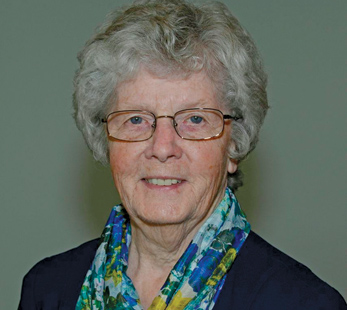May Christ bring us all together to everlasting life. Rule of Benedict
Jesus said, "Make your home in me," (John 15:4) and we pray in joy and hope to be able to do that, both here and in the afterlife. But no matter how much we might believe our loved ones have gone to Jesus when they die, their deaths remain crushing experiences for us. We must learn to live without them, to not listen for their footsteps in the hall, to not set an extra place at the table.
When Sr. Sheila McGrath's brother died unexpectedly several years ago, the family was devastated. Every holiday felt empty, every season brought the searing reminder that he was gone. Although they decided to go forward with plans for a reunion in July, they were anxious about it. How would it feel with everyone there but him?
Sr. Sheila, a former hospital chaplain, suggested they hold a small service for him to recognize and express their feelings, and ask God for the strength they needed to continue to live their lives without him.
"We lighted two red, two white and two blue candles, because it was the Fourth of July," Sr. Sheila remembers. "We each took a turn reciting a lovely prayer. Then we shared stories about him. It was very meaningful to all of us."
The reunion was a happy and more carefree experience, Sr. Sheila says, because family members shared their feelings and prayers out loud. They encountered their grief. "We all need to work through our grief," she says. "It takes time. The first year – the holidays, the seasons, the birthdays – every time they happen, they prick the soul. You truly have to go through the grief, though. You can't go around it."
Imagine standing in front of a field full of burrs, Sr. Sheila suggests. It is your grief, and the only way to the other side is straight through it.
"Some people refuse to enter it," she says. "They're the ones who keep busy, and keep saying, 'I'm fine.' Their grief is eating them up inside, but their busyness keeps them distracted. Another group steps into the field but gets stuck. They get jabbed over and over by the burrs and stay right where they are. The third group keeps putting one foot in front of the other, walking through the field, through the burrs. They reach the other side with resolution and peace."
Friends and family can help with the grieving process, but don't always understand that people need to express the same feelings over and over for a while after losing a loved one. Sr. Sheila says support groups can help.
"Support groups allow you to really express yourself, because the members have had similar experiences," she says. "They don't tell you not to feel a particular way, or offer platitudes like, Well, at least he's gone to a better place."
Getting involved with a support group often is best done several months after your loved one's death, Sr. Sheila says, after friends and family have returned to their lives and perhaps expect you to, too.
However you walk through the field though, the main thing is to keep moving. Let life go on; welcome it. "Make some quiet time for yourself during the day," she says. "Sit on a bench outside the office for a moment. Listen to a bird sing. Watch the clouds. Pray: God be with me as I face today's challenges and joys and whatever comes my way. Try to stay open to how God speaks to you and comforts you."
